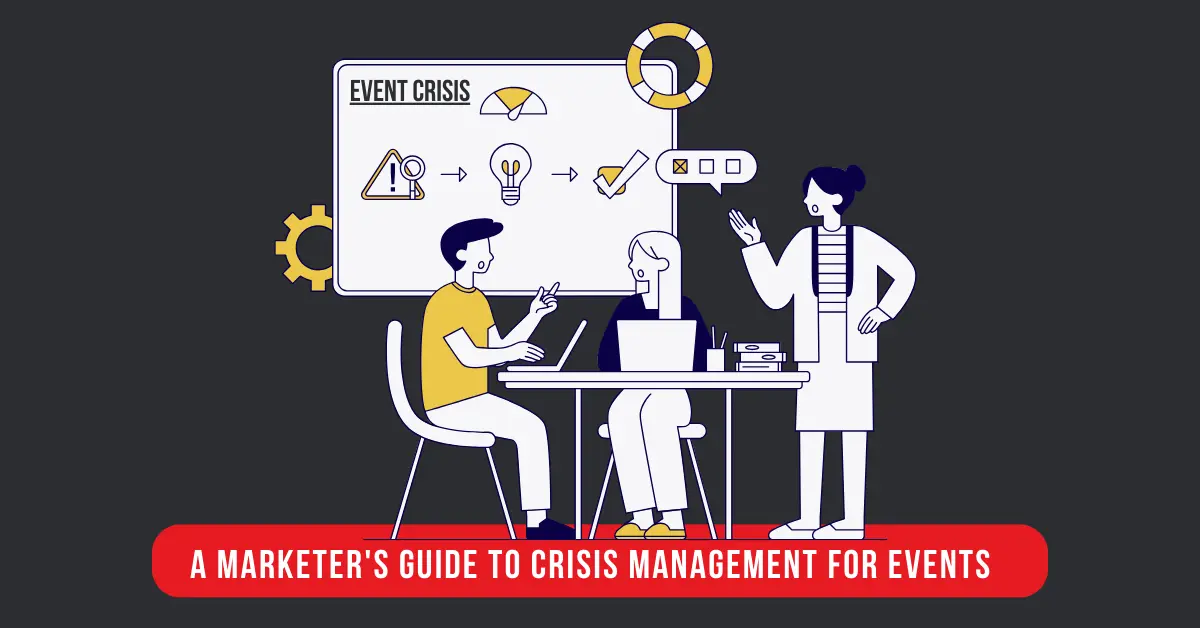Event planners and marketers create incredible experiences. From creating fascinating themes to getting A-list speakers, every aspect is methodically prepared to provide an unforgettable event. However, even the most precisely planned event may be disrupted by unanticipated circumstances or a single mistake.
Imagine you’ve precisely arranged an event, and the stage lights illuminate a crowded venue, humming with excitement. Suddenly, the power goes out, leaving the event in darkness, or a social media firestorm breaks out over a perceived issue, or even worse, a guest has a medical emergency. These scenarios can quickly morph your dream event into a PR nightmare. But fear not, marketing superheroes! This guide equips you with the tools to navigate any crisis that might arise, ensuring a smooth recovery and minimizing damage.
Why Crisis Management Matters for Event Marketers
A recent study by Forbes revealed that a staggering 69% of leaders have faced at least one corporate crisis in recent years. With an average of 3 crises experienced per leader, it’s clear that unexpected events are a reality for any organization.
In the event world, a crisis can translate to several significant consequences:
Damaged Reputation: A single poor encounter may rapidly go global on social media, ruining your brand’s image and discouraging future consumers.
Revenue Loss: Event cancellations or poor publicity can result in a major decline in sales of tickets, sponsorships, and future business.
Legal ramifications: Depending on the extent of the problem, you may suffer financial ruin.
Demoralized Team: A badly managed crisis can leave your team worried, frustrated, and unclear about what to do.
The Three Stages of Event Crisis Management
The secret to withstanding all troubles is to be ready for them even before they rear their faces, rather than waiting to tackle them once they appear by surprise. Let’s explore the three crucial stages of event crisis management:
1. Pre-Crisis Preparation: Planning for the Unexpected
Just like an actor rehearsing before stepping on the stage, success in crisis management is about proper preparation. Here are some key steps to take:
Identify Potential Crises: Think of all the possible disastrous situations that may influence your function. This might involve technical breakdowns such as power failures and sound system problems as well as issues on guest safety like allergic reactions or medical emergencies on one hand while on the other, it may also encompass weather disturbances like floods or power grid breakdowns; negative social media buzz emanating from misinformation or disgruntled attendees is yet another case.
Develop a Crisis Management Plan: This comprehensive document should outline your response strategy for different crisis scenarios. It should include:
- Communication Protocols: Who will be responsible for communicating with stakeholders (guests, media, sponsors)? How will communication take place (press releases, social media updates, email)?
- Chain of Command: Clearly describe who has the decision-making power during an emergency and who should execute extereme decisions.
- Damage Control Measures: Identify a plan for mitigating the impact of various crisis scenarios. This might involve cancellation/rescheduling procedures, emergency contact information, and resource allocation.
- Pre-written Communication Templates: Having pre-written communication templates for press releases and social media statements. It saves valuable time during a crisis. These templates should be adaptable to different situations but maintain a consistent brand voice.
- Assemble Your Crisis Team: Identify important members of your team who will lead the crisis response. This team should comprise people from marketing, communication, logistics, and security.
- Training and Education: Don’t let your crisis management strategy collect dust! Train your staff on their roles and duties, and do frequent simulations to ensure your plan’s efficacy. Consider collaborating with a crisis management professional to provide additional training and assistance, particularly for large-scale events.
By implementing these proactive efforts, you’ll be better prepared to deal with any unexpected situations that may emerge.
Also Read: Mastering Event Management: The 5 Key Stages
2. Crisis Response: Lights, Camera, Control
Despite your best efforts, a crisis may still strike. Here’s what you need to do in the heat of the moment:
- Activate Your Crisis Team: Gather your crisis team immediately to analyze the situation and choose the best course of action.
- Communicate quickly and honestly: Transparency is crucial. Press releases, social media updates, and internal team communications should all have clear and concise assertions. Acknowledge the problem, describe what efforts you’re taking to solve it, and offer your care for people affected.
- Focus on Safety: The safety of your guests and employees is critical. Implement appropriate safety practices based on the crisis. This might include evacuating the site in the event of a fire, giving medical care, or rerouting people due to weather difficulties.
- Mitigate Damage: Act at once to control the crisis and reduce its effects. Some sections of the event might need to close down or get postponed completely, offer refunds to those guests who have been inconvenienced or additional benefits available to customers.
3. Post-Crisis Recovery: Lessons Learned and Moving Forward
The crisis might be gone, but your job isn’t done yet. Recovering from the damage is as essential as preparing for the same. Here is how to make sure that the recovery process is seamless:
- Maintain Communication: Provide continuous updates on how you are handling the crisis and what measures you are putting in place to avert future occurrences to different stakeholders. To build trust; be honest and show that you care.
- Evaluation and Analysis: Conduct a thorough review of the crisis and your response. Identify areas for improvement in your crisis management plan and update it accordingly. This might involve revising communication protocols, adding resources, or strengthening training procedures.
- Learning from Mistakes: This is a critical learning opportunity. Share the lessons learned with your team to ensure you become more resilient in the face of future challenges.
- Rebuild Trust: Regaining the trust of your audience takes time and effort. Implement strategies to rebuild your reputation, such as offering genuine apologies, demonstrating a commitment to improvement, and focusing on positive customer experiences in future events. Leverage social media to showcase your dedication to positive change.
Bonus Tip: Embrace Social Media During a Crisis
Social media presents a double-edged sword during a crisis. While it can quickly become a grooming ground for negativity and misinformation, it also serves as a powerful tool for direct and transparent communication with your audience. Below are some guidelines that can help one to use social media properly when there is a crisis:
- Acknowledge the situation: Don’t shy away from addressing the issue. Post a clear and concise statement acknowledging the crisis and expressing your concern.
- Be transparent: Provide regular updates on the problem and the efforts you’re making to address it.
- Respond to comments and messages: Show empathy and respond to any questions or concerns made by attendees and stakeholders.
- Keep a consistent brand voice: Even amid a crisis, make sure your communications reflect your brand’s personality.
With these guidelines in hand, it is possible to change an impending catastrophe into an educative moment, a scenario from which you can emerge as a stronger person. Remember, a well-prepared and adaptable marketing team can navigate any crisis and ensure a successful event experience for all. Do not let anomaly occurrences ruin your advertising campaigns. With an advanced game plan and an all-encompassing emergency organization scheme, you are equipped to take care of all unanticipated cases and maintain the best possible performance of the event.
Thank you for joining us. We realize the events marketing world could be complicated and even the most seasoned experts should anticipate unforeseen challenges. Visit the Grid Advertising Blog for further information and detailed technical assistance on marketing subjects.
We offer a wealth of informative articles and practical tips to empower event marketers at every stage of their journey. So, stay tuned and keep conquering those marketing challenges!

